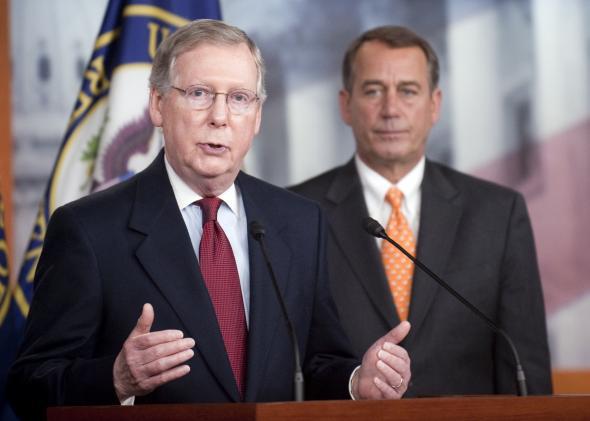Everywhere, Republicans are harrumphing about the Environmental Protection Agency’s new emissions rules, which require power plants to reduce their carbon-dioxide emissions by 30 percent from their 2005 levels. Senate Minority Leader Mitch McConnell called the rules a “dagger in the heart of the American middle class, and to representative democracy itself,” while Missouri Sen. Roy Blunt promised to “fight President Obama every step of the way to stop this unprecedented power grab.” Of course, as a rule issued under established powers for the EPA, this is the opposite of a “power grab.”
If Republicans are outraged by the announcement, they only have themselves to blame. It is true that in recent months, the administration has been vocal—even strident—about the danger of climate change. In February, for example, Secretary of State John Kerry derided global warming deniers as members of the “Flat Earth Society” who are “burying their heads in the sand.” At the same time, the White House didn’t begin with a regulatory approach.
In 2009, President Obama threw his support behind climate legislation in the House, and the following year, a group of Senate Democrats—including Kerry—began work with Republicans to craft a bipartisan climate bill. The process fell apart, a victim of bad management from the White House, election year politics, an embattled and fearful Sen. Lindsey Graham—the South Carolina senator at the center of the negotiations—and the growing tide of Republican anti-Obama sentiment, which would culminate that fall with a huge GOP victory in the House of Representatives.*
It’s not that EPA action wasn’t possible, but that the administration wanted legislation and would make key concessions to get it. In the absence of a law, however, the White House was prepared to act alone. “If Republicans didn’t respond to the proposed deals,” wrote The New Yorker’s Ryan Lizza, “the White House could push them to the table by making a threat through the Environmental Protection Agency, which had recently been granted power to regulate carbon, just as it regulates many other air pollutants.”
With a little cooperation, Republicans could have won a better outcome for their priorities. They could have exempted coal from more stringent spectrum of regulations, enriched their constituencies with new subsidies and benefits, and diluted a key Democratic priority. Instead, they’ll now pay a steep substantive price for their obstruction, in the form of rules that are tougher—and more liberal—than anything that could have passed Congress.
But this isn’t the first time Republicans have sabotaged themselves. The entire story of Obamacare is a case study in the self-defeating futility of GOP obstruction.
At various points in 2009 and 2010, Republicans could have transformed the Affordable Care Act. During the “Gang of Six” negotiations, when Sen. Max Baucus worked for months to win support from his GOP colleagues on the Finance Committee, Republicans could have won major concessions in exchange for their votes. That was true again after Scott Brown’s win in the Massachusetts special election for the Senate. By beating Martha Coakley, Brown had cracked the party’s filibuster-proof majority, giving leverage to Republicans and leaving Democrats shook from surprise.
“It is vital that we restore the respect of the American people in our system of government and in our leaders. To that end, I believe it would only be fair and prudent that we suspend further votes on health care legislation until Senator-elect Brown is seated,” said then-Sen. Jim Webb of Virginia, calling for Democrats to hold off on further action. Likewise, conservative Democrats like Sen. Ben Nelson of Nebraska called on President Obama to restart the whole enterprise and look for broad, bipartisan solutions.
With a single fig leaf of cooperation, Sen. McConnell could have broken the Democratic coalition for a comprehensive reform bill and dismantled the existing proposal. Had he and any other Republican been willing to play ball, they could have built a modest reform plan that left even more of the current system intact, forcing Democrats—and liberals in particular—to take less than half a loaf.
Instead, the party doubled-down on its opposition. It refused to budge, and in doing so, gave Democrats time to regroup and recover their nerve. Which is what happened. And less than two months after Sen. Scott Brown “doomed” health care reform, President Obama signed the Affordable Care Act, creating a new wing of the American welfare state.
Moreover, with its new taxes, new subsidies, and generous Medicaid expansion, it was larger and more liberal than it would have been in a world where Republicans—and not conservative Democrats—formed the right-most pole of debate and negotiation. Indeed, this dynamic—Republican obstruction leading to more liberal outcomes—has continued with the implementation of Obamacare. The law was designed with some decentralization in mind. Rather than a single national exchange for health insurance, lawmakers went with 50 individual exchanges, that states could run as they wanted. But, as Politico reports, a combination of technical problems and Republican obstruction have left us with the emergence of a de facto national system:
The federal option was supposed to be a limited and temporary fallback. But a shift to a bigger, more permanent Washington-controlled system is instead underway—without preparation, funding or even public discussion about what a national exchange covering millions of Americans means for the future of U.S. health care. It’s coming about because intransigent Republicans shunned state exchanges, and ambitious Democrats bungled them.
It’s not hard to imagine a future 20 years hence where a Democratic president is signing the law that brings a “public option” to the national health exchanges that grew out of this development. Or, put another way, after five years of relentless obstruction in the name of small government, Republicans may have helped set the stage for a world where government is much bigger—and expansive—than it is now. And if it happens, we should remember to thank Republicans for helping to make it possible.
Correction, June 4, 2014: This post originally misspelled Lindsey Graham’s first name.
